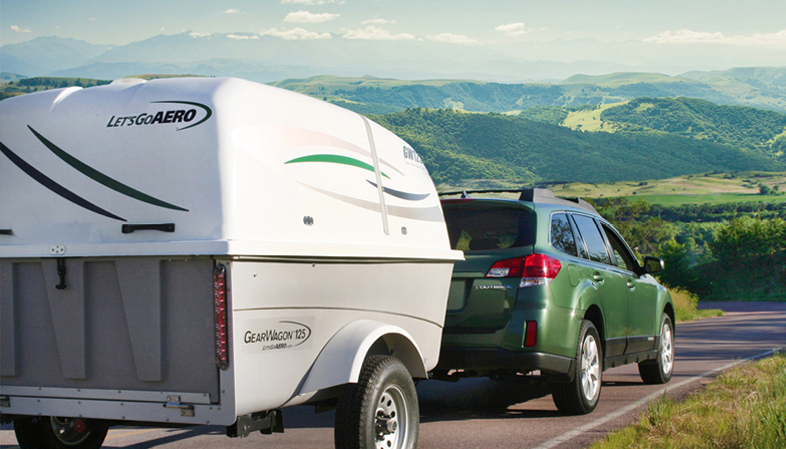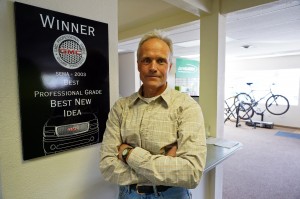
A camping and trailer gear manufacturer has struck a deal to get into more stores. Photos courtesy of Let’s Go Aero.
It’s no easy picnic to dethrone an industry juggernaut. But that’s just what Colorado Springs inventor Marty Williams intends to do.
And he’s kicking off his plan to grab market share from the biggest brands in camping with a major licensing deal and a capital raise.
Williams, founder of camper and trailer designer Let’s Go Aero, secured a two-year licensing agreement with Kampgrounds of America (KOA) last fall to use its logo on outdoor products ranging from sleeping bags and tents to electronics and to sell the equipment in KOA stores.
And Williams said he’s currently negotiating with national retail chains to carry the products in 2016.
“In the outdoor sector, there’s a need and demand for a new brand,” Williams said. “We are emerging as an alternative to Coleman.”
Let’s Go Aero is currently worth about $4.5 million, Williams said, and it’s looking to raise another $1.5 million. The funding will go toward stocking inventory, financing trade shows, advertising and paying off old debts, he said.
Williams is trying to secure financing through venture capitalists instead of banks. He has attended a pitch training program with the Rockies Venture Club and hopes that he will be invited back for the real deal.
“It’s a high net-worth opportunity,” Williams said. “It’s not a bank deal; it’s for five or 10 high net-worth guys.”
Focusing on tents and sleeping bags is a departure from Let’s Go Aero’s original business model. Since Williams founded the company in 1998, he’s focused on designing products like campers, shelters and trailers. Its best seller is the silent hitch pin, an item designed to eliminate shock and noise when towing trailers. Williams estimates the pin will account for 40 percent of his 2015 revenue.
“We’re doing about $120,000 per month,” Williams said. “Our business plan has $2 million in sales by the end of this year. That’s up $600,000 from last year.”
His reason for expanding is simple: he sees market share that’s ripe for the taking.
And if he’s successful in negotiating retail contracts with stores like Walmart, Sports Authority and Cabela’s, Let’s Go Aero products could be on the same shelves as major brands.
“The KOA brand opened huge doors for us,” Williams said. “It gives us a lot of pull in terms of retail traffic.”
With almost 500 locations throughout North America, KOA is the world’s largest system of privately-owned campgrounds. In 2011, equipment sales in KOA stores totaled more than $1.5 billion, according to the Outdoor Industry Association.
In return for the licensing, KOA receives 5 percent of revenue generated from the sales with an additional 3 percent if the items are sold through KOA’s stores.
Williams, 55, has been an inventor since an early age.
“I grew up on a farm in South Dakota,” he said. “Whenever something broke, you figured out how to fix it.”
He studied biochemistry in college and worked as a stock broker from 1982 until founding Let’s Go Aero in 1998 at the age of 38.
Williams’ push for funding is tied in part to Let’s Go Aero’s involvement with two multi-year lawsuits with a former licensee, Cequent Performance Products. Cequent sued Let’s Go Aero in 2010 for breaching their licensing agreement. Let’s Go Aero filed for Chapter 11 bankruptcy in 2011 while the case was still open.
The parties settled that case in 2012. But Let’s Go Aero filed another suit last June, alleging that Cequent violated one of Williams’ patents. The case is still ongoing.
“That’s why we’re hurting so bad for cash,” Williams said. “We’ve had to use close to a million dollars to defend our property. These guys are infringing, and they owe me money.”
Cequent sees things differently. Its lawyer, David Cupar, said the case has no merit.
“Let’s Go Aero’s complaint is without legal or factual merit,” Cupar said. “Let’s Go Aero’s recent filing before the federal court in Colorado is in violation of the arbitration clause in the (2010 case’s) settlement agreement.”
Instead of dwelling on his legal troubles, however, Williams is staying focused on his business plan.
“The KOA thing for us is a silver bullet,” he said. “Now the only risk factor for us is to raise our capital and execute our go-to-market strategy.”

A camping and trailer gear manufacturer has struck a deal to get into more stores. Photos courtesy of Let’s Go Aero.
It’s no easy picnic to dethrone an industry juggernaut. But that’s just what Colorado Springs inventor Marty Williams intends to do.
And he’s kicking off his plan to grab market share from the biggest brands in camping with a major licensing deal and a capital raise.
Williams, founder of camper and trailer designer Let’s Go Aero, secured a two-year licensing agreement with Kampgrounds of America (KOA) last fall to use its logo on outdoor products ranging from sleeping bags and tents to electronics and to sell the equipment in KOA stores.
And Williams said he’s currently negotiating with national retail chains to carry the products in 2016.
“In the outdoor sector, there’s a need and demand for a new brand,” Williams said. “We are emerging as an alternative to Coleman.”
Let’s Go Aero is currently worth about $4.5 million, Williams said, and it’s looking to raise another $1.5 million. The funding will go toward stocking inventory, financing trade shows, advertising and paying off old debts, he said.
Williams is trying to secure financing through venture capitalists instead of banks. He has attended a pitch training program with the Rockies Venture Club and hopes that he will be invited back for the real deal.
“It’s a high net-worth opportunity,” Williams said. “It’s not a bank deal; it’s for five or 10 high net-worth guys.”
Focusing on tents and sleeping bags is a departure from Let’s Go Aero’s original business model. Since Williams founded the company in 1998, he’s focused on designing products like campers, shelters and trailers. Its best seller is the silent hitch pin, an item designed to eliminate shock and noise when towing trailers. Williams estimates the pin will account for 40 percent of his 2015 revenue.
“We’re doing about $120,000 per month,” Williams said. “Our business plan has $2 million in sales by the end of this year. That’s up $600,000 from last year.”
His reason for expanding is simple: he sees market share that’s ripe for the taking.
And if he’s successful in negotiating retail contracts with stores like Walmart, Sports Authority and Cabela’s, Let’s Go Aero products could be on the same shelves as major brands.
“The KOA brand opened huge doors for us,” Williams said. “It gives us a lot of pull in terms of retail traffic.”
With almost 500 locations throughout North America, KOA is the world’s largest system of privately-owned campgrounds. In 2011, equipment sales in KOA stores totaled more than $1.5 billion, according to the Outdoor Industry Association.
In return for the licensing, KOA receives 5 percent of revenue generated from the sales with an additional 3 percent if the items are sold through KOA’s stores.
Williams, 55, has been an inventor since an early age.
“I grew up on a farm in South Dakota,” he said. “Whenever something broke, you figured out how to fix it.”
He studied biochemistry in college and worked as a stock broker from 1982 until founding Let’s Go Aero in 1998 at the age of 38.
Williams’ push for funding is tied in part to Let’s Go Aero’s involvement with two multi-year lawsuits with a former licensee, Cequent Performance Products. Cequent sued Let’s Go Aero in 2010 for breaching their licensing agreement. Let’s Go Aero filed for Chapter 11 bankruptcy in 2011 while the case was still open.
The parties settled that case in 2012. But Let’s Go Aero filed another suit last June, alleging that Cequent violated one of Williams’ patents. The case is still ongoing.
“That’s why we’re hurting so bad for cash,” Williams said. “We’ve had to use close to a million dollars to defend our property. These guys are infringing, and they owe me money.”
Cequent sees things differently. Its lawyer, David Cupar, said the case has no merit.
“Let’s Go Aero’s complaint is without legal or factual merit,” Cupar said. “Let’s Go Aero’s recent filing before the federal court in Colorado is in violation of the arbitration clause in the (2010 case’s) settlement agreement.”
Instead of dwelling on his legal troubles, however, Williams is staying focused on his business plan.
“The KOA thing for us is a silver bullet,” he said. “Now the only risk factor for us is to raise our capital and execute our go-to-market strategy.”



Leave a Reply